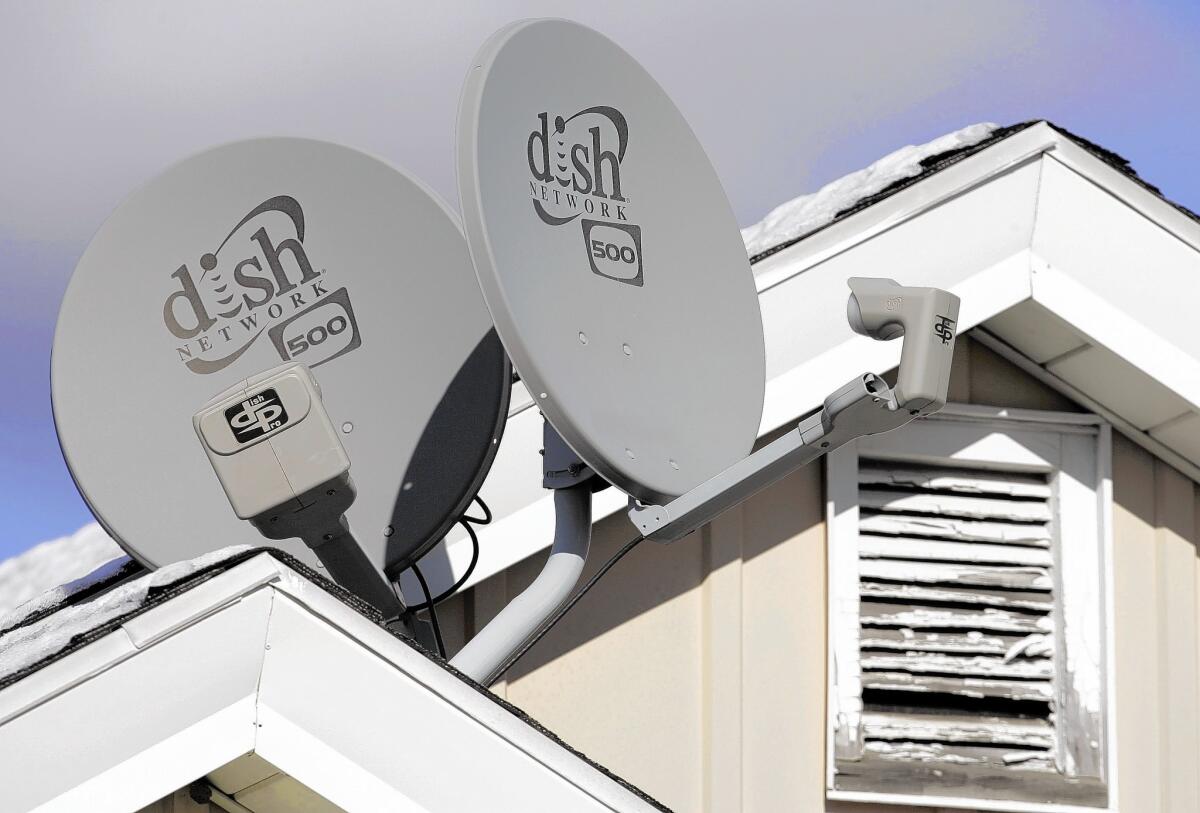Disney-Dish Network pact may alter TV viewing habits

Walt Disney Co. and satellite TV provider Dish Network’s sweeping new agreement could lead to changes in the way consumers watch television.
The comprehensive distribution deal, announced late Monday, is expected to become a blueprint on how the television industry treats the increasingly important digital rights for valuable programming.
Dish secured Internet streaming rights for content from Disney’s ESPN, ESPN2, ABC Family and Disney Channel as well as the eight ABC television stations that Disney owns.
PHOTOS: Upcoming Disney spring films and beyond
The satellite TV company intends to use the Disney programming to build a new nationwide TV service that would be offered over the Internet — bypassing Dish’s current delivery system.
Dish has not said when it might launch its planned wireless television service.
“We all know video consumption patterns are changing,” Dave Shull, Dish’s executive vice president, said Tuesday in an interview. “Some homes are less interested in traditional pay-TV, and we think the opportunity is on the wireless side.”
Such a service would create a new business opportunity for Dish, which provides service to 14 million customers. The planned service would be designed to appeal to the so-called never-connected generation of young people, who consume much of their entertainment via computers and tablets, and thus have been difficult recruits for traditional cable and satellite TV providers.
“It would hit a market that they want to reach — single people, young couples — those who don’t otherwise subscribe to pay TV,” said Michael Nathanson of the Moffett-Nathanson research firm.
Disney won several significant provisions. The deal includes distribution for such new channels as Disney Junior; ESPN3; multicultural channel Fusion, which is Disney’s joint venture with Univision Communications; the Longhorn Network; and a planned college Southeastern Conference ESPN Network, which is scheduled to launch in August.
The agreement also requires that Dish disable its controversial ad-skipping feature called AutoHop for shows on Disney’s ABC network — one of Disney’s demands. Dish’s AutoHop feature enables Dish subscribers to automatically record prime-time shows on broadcast networks and, with a push of a button, strip out all of the commercials.
Dish said it would block the AutoHop function for at least three days after an ABC show airs on the network.
Broadcasters, including ABC, are trying to protect the crucial three-day window because advertisers pay for viewers who record and watch programs within three days of a show’s network airing.
Nearly two years ago, broadcast networks Fox, CBS, NBC and ABC sued Dish over the satellite TV company’s commercial-skipping feature.
This week’s agreement signals a retreat by Dish, which had been winning preliminary court rulings in the high-stakes battle with the TV networks over AutoHop.
As part of the accord, Disney said it would withdraw its lawsuit against Dish Network over the ad-skipping technology.
PHOTOS: Disney’s animated lineup: 1984 - 1994
Dish recognizes the importance of advertising revenue to the networks, Shull said, and so the company was willing to be flexible on the AutoHop technology to ensure a good working relationship with Disney.
“We wanted to make sure we helped them with their advertising business,” he said.
Dish and Disney have been negotiating a new long-term agreement for more than six months to renew a pact that expired in September. The lengthy negotiating process was necessary for the two sides to sort through complex issues that will govern the industry for at least an additional five years.
“We knew early on we had a responsibility with this deal to not only do what was best for our business, but to also position our industry for future growth,” Anne Sweeney, president of the Disney/ABC Television Group, said in a statement. “Not only were innovative business solutions reached on complicated current issues, we also planned for the evolution of our industry.”
The Disney-Dish deal is expected to serve as a template for other entertainment companies haggling over new carriage agreements with pay-TV distributors.
At an investor conference Tuesday, CBS Chief Executive Leslie Moonves praised the Disney-Dish accord.
“This is a great preliminary step for everybody,” Moonves said, adding that CBS is scheduled to negotiate a new distribution deal with Dish by the end of this year. “It’s going to be an interesting conversation.”
The Disney-Dish deal renews carriage for the eight television stations that Disney owns, including KABC-TV Channel 7 in Los Angeles.
ON LOCATION: Where the cameras roll
As part of the deal, Dish customers also will be able to access Disney-branded video-on-demand products, including the Watch ESPN and Watch ABC applications, in their homes and on mobile devices. Those offerings do not allow viewers to fast-forward through commercials, part of the industry’s strategy of attempting to preserve the lucrative economics of television.
Major companies, including Disney and Comcast Corp., have been promoting video-on-demand services that encourage people to watch their shows with commercials.
Dish’s plan for a wireless TV service is probably several years away because Dish first must secure streaming rights from other major programming services, such as Viacom Inc., NBCUniversal and 21st Century Fox.
But if and when it arrives, Dish’s Internet service might look a lot like what Dish offers now — a set package of channels — and not the “a la carte” service that some consumer activists have been demanding from the industry.
“This is not a la carte in any way, shape or form,” Bernstein & Co. media analyst Todd Juenger wrote in a report.
Nathanson agreed.
“No one is going to agree to provide their channels separately for an unbundled product,” he said.
More to Read
From the Oscars to the Emmys.
Get the Envelope newsletter for exclusive awards season coverage, behind-the-scenes stories from the Envelope podcast and columnist Glenn Whipp’s must-read analysis.
You may occasionally receive promotional content from the Los Angeles Times.












